高中英语必修四Unit4课文详解Book4-unit4
人教版英语必修四4Unit4(Showing Our Feelings)课程教学设计

Book4 Body LanguageShowing Our Feelings教学设计河北饶阳中学王晓莉一、教学内容(Teaching Content)人民教育出版社普通高中课程标准试验教科书英语必修四Body Language第三课时---Showing Our Feelings.二、教学设计(Teaching Plan)(1)教学思路本单元的中心话题是“身势语”,各项活动的设计都围绕着这个主题进行。
身势语是非语言交际手段中非常重要的一个方面,它通过无声的语言表达一个人的内心世界。
与有声语言一样,身势语也是文化的载体,在跨文化交际中起着举足轻重的作用。
了解身势语的不同文化涵义并正确地加以运用,会在交际场合中起到意想不到的好效果。
通过本堂课的学习,学生们能够了解世界各地的人们表达各种各样的情感、愿望和态度,“读懂”我们周围人的意思。
整个教学过程以“ 以学生为学习主体” 为设计理念,采用设置任务和小组讨论的形式组织教学,将学生的自主学习调动起来并把这样的活动作为课堂的主体,引导学生完成学习任务。
(2)课前准备要求学生预习课文Showing Our Feelings,并找出我们周围人们是怎样表达快乐、不高兴、愤怒、厌烦等情感的。
三、学生情况分析我们的学生绝大多数来自农村,学习英语的条件有限,大部分是上了初中才开始学习英语,所以英语意识淡薄,知识薄弱。
面对这样一群孩子,吸引他们对英语的兴趣是关键,因此我在这节课中使用了大量的图片,一方面吸引他们的注意力,引起兴趣,另一方面很大限度地帮助了学生们对这篇课文的理解。
四、三维目标(Teaching Aims)(1)知识目标(Knowledge Aims)让学生了解“身势语”的概念,掌握身势语的不同文化涵义并正确地加以运用。
通过阅读熟悉本课的相关单词、短语及重点句型,如spoken, unspoken, likely, be likely to, in general, at ease, etc.(2)能力目标(Ability Aims)提高学生的阅读能力,训练学生skimming和scanning的阅读技巧,提高学生归纳总结、善于提取有用信息的能力; 在教学总过程中锻炼学生听、说、读、写各方面的技能,培养学生独立思考和合作学习的能力; 快速获取信息和处理信息的能力。
高中英语必修四Unit课文详解Bookunit
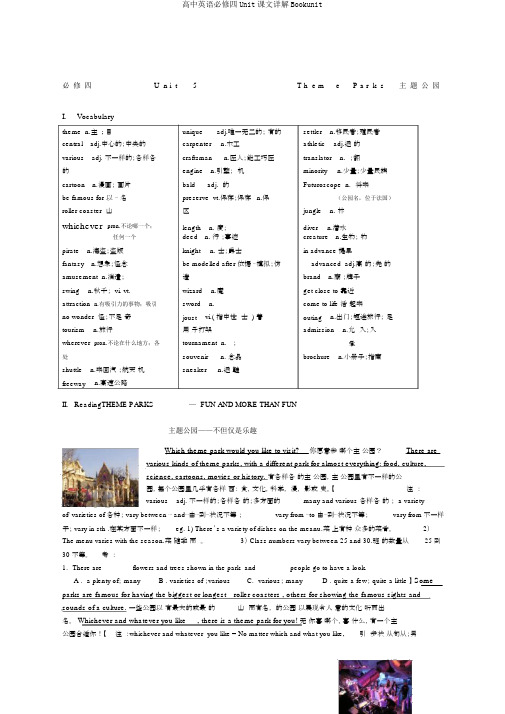
必修四U n i t5T h e m e P a r k s主题公园I.Vocabularytheme n.主 ;目unique adj.唯一无二的;有的settler n.移民者;殖民者central adj.中心的;中央的carpenter n.木工athletic adj.运的various adj. 不一样的;各样各craftsman n.匠人;能工巧匠translator n.;翻的engine n.引擎;机minority n.少量;少量民族cartoon n.漫画;画片bald adj.的Futuroscope n.将来be famous for 以⋯名preserve vt.保存;保存 n.保(公园名,位于法国)roller coaster 山区jungle n.林whichever pron.不论哪一个;length n.度;diver n.潜水任何一个deed n. 行;事迹creature n.生物;物pirate n.海盗;盗版knight n.士;爵士in advance 提早fantasy n.想象;怪念be modelled after 依据⋯模拟;仿advanced adj.高的;先的amusement n.消遣;造brand n.商;牌子swing n.秋千; vi. vt.wizard n.魔get close to 靠近attraction n.有吸引力的事物;吸引sword e to life 活起来no wonder 怪;不足奇joust vi.( 指中世士 )着outing n.出门;短途旅行;足tourism n.旅行用矛打架admission n.允入;入wherever pron.不论在什么地方;各tournament n.;承处souvenir n.念品brochure n.小册子;指南shuttle n.来回汽;航天机sneaker n.运鞋freeway n.高速公路II. ReadingTHEME PARKS— FUN AND MORE THAN FUN主题公园——不但仅是乐趣Which theme park would you like to visit?你愿意参哪个主公园?There are various kinds of theme parks, with a different park for almost everything: food, culture,science, cartoons, movies or history. 有各样各的主公园,主公园里有不一样的公园,每个公园里几乎有各样西:食,文化,科学,漫,影或史。
book4_unit4_reading人教版高中英语必修四第四单元
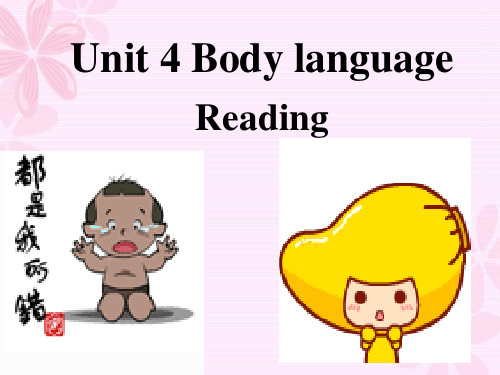
languages are bad. F
5.All members of a culture behave in the
same way.
F
TASK 3:Answer the following questions
1. Is the author of this passage male or female? How do you know ? 2.What were the two mistakes that the author noticed? 3.How can we understand “These actions are not good or bad”?
Fill in the blanks
Body language is used by people for sending messages to one another. In many countries in
the world, men k_is_s__ each other when they meet. In Britain, people usually s_h_a_k_e_ hands
think deeply
stomachache go this way
【课堂互动探究】
Look at the pictures. What are the following ways of communicating?
gesture
posture
facial expression eye contact
Para.1
ParSt.u2mmaDriizfefetrheentmsatuindeidnetas haaccvoerddiifnfegrteont (Parat.h2e-3m) eagnreinetginagndcuksetyomweorrsd. s.
高中英语必修四Unit4重点总结

高中英语必修四Unit4重点总结本文档对高中英语必修四Unit4进行重点总结,主要包括以下内容:1. The Speaker's Background 说话者的背景本单元的内容主要关注两个不同背景的人物:Jin Jing和Li Wei。
Jin Jing是一位知名的中国残奥会举重冠军,她在比赛中取得了优异的成绩。
作为一位身体残疾人,Jin Jing以她坚韧不拔的精神和毅力激励着许多人。
Li Wei是一位普通的中国中学生,他对Jin Jing非常崇拜并受到她的影响。
他充满激情地从事自己的学业,并在研究和生活中展现出了积极向上的态度。
2. The Power of Encouragement 鼓励的力量通过Jin Jing和Li Wei的故事,我们了解到鼓励对一个人的成长和发展有着巨大的影响。
Jin Jing在面对困难和挑战时,从她的教练、家人和朋友那里获得了鼓励和支持。
这些正能量激励着她不断努力去追求自己的梦想,并最终获得了成功。
Li Wei通过看到Jin Jing的努力和成就,被激发出积极向上的心态。
他相信自己也可以通过努力和坚持来实现自己的目标,并取得了显著的进步。
因此,我们应该学会在他人面临困难和挑战时给予鼓励和支持,这将激励他们克服困难并取得成功。
3. Facing Challenges 面对挑战Jin Jing和Li Wei的故事向我们展示了面对挑战时的正确态度。
Jin Jing以乐观、坚韧的态度面对自己的身体残疾,不同意放弃自己的梦想。
她通过积极地锻炼和努力训练来改善自己的身体能力,并最终成为一名优秀的举重运动员。
Li Wei在研究上遇到困难时也没有退缩。
他坚信只要努力研究,就能克服困难并取得好成绩。
他通过刻苦研究和寻求帮助,逐渐提高了自己的英语水平。
因此,我们要学会正视挑战并以积极的态度去面对,相信自己的能力,努力克服困难。
只有这样,我们才能取得进步和成功。
以上是本文档对高中英语必修四Unit4的重点总结。
Unit 4 Sharing Reading Thinking 课文高中英语人教版选择性必修第四册
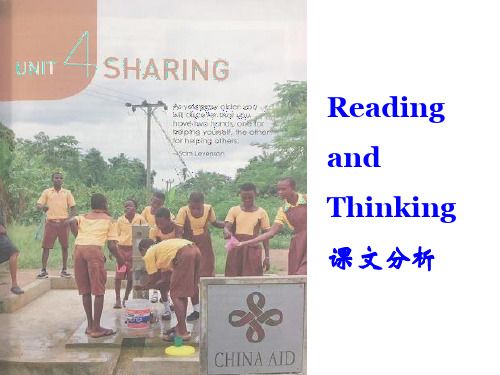
宾语从句。
let alone
需跟与前面相同的平行结 Today, some young
构。用在否定句后,表示 people never even read
由于极可能发生的事情都 没有发生,某种情况就更
a newspaper, let alone
不可能了。
a book.
【语境应用】用let alone或not to mention完成句子。 1) They have three dogs to look after, __n_o_t__to__m_e_n_t_i_o_n_/_
some sweets and jam from home; I’ve
been dying to have some of my
be dying to do sth ቤተ መጻሕፍቲ ባይዱ望做某事
favourite sweets, and it’s always nice to
get mail!
1. I’ve been dying to have some of my favourite sweets, and it’s always nice to get mail!
我一直非常渴望吃一些我最喜欢的糖果,而且 收到邮包总是令人开心不已。
be dying for / to do sth: to be extremely eager to have / do sth 极想得到,渴望得到,渴望做某事
eg I’m dying to hear your news. I’m dying for something to eat.
➢ in chorus all together; in unison
同时;一起
eg There was a chorus of agreement from the committee.
高中英语 Book4 Unit4body language 说课课件 新人教必修4(通用)
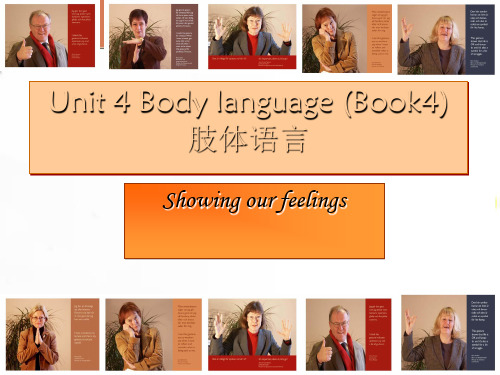
1). Analysis of the teaching material 教材分析
The type of this class is an extensive reading class, which plays an important part in developing students’ reading ability. So,during the teaching process, the teacher should focus on developing the students’s reading ability by extensive reading, and get them to learn some reading skills such as skimming, scanning and so on. Moreover, the students should receive some moral education, let them know more about body language in cultures in different countries.
课前探索(Pre-class Exploration):
Let students search for more information about body language which shows different meanings in different cultures and countries.
掌握该部分的重点词句
3.Let students read and understand the passage “Showing our feelings”.
让学生读懂本篇文章
Teaching difficult points (教学难点)
高中英语必修四第四单元课文翻译
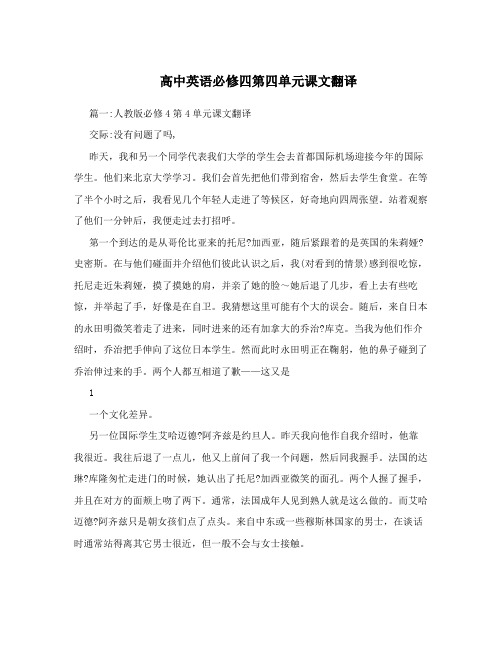
高中英语必修四第四单元课文翻译篇一:人教版必修4第4单元课文翻译交际:没有问题了吗,昨天,我和另一个同学代表我们大学的学生会去首都国际机场迎接今年的国际学生。
他们来北京大学学习。
我们会首先把他们带到宿舍,然后去学生食堂。
在等了半个小时之后,我看见几个年轻人走进了等候区,好奇地向四周张望。
站着观察了他们一分钟后,我便走过去打招呼。
第一个到达的是从哥伦比亚来的托尼?加西亚,随后紧跟着的是英国的朱莉娅?史密斯。
在与他们碰面并介绍他们彼此认识之后,我(对看到的情景)感到很吃惊,托尼走近朱莉娅,摸了摸她的肩,并亲了她的脸~她后退了几步,看上去有些吃惊,并举起了手,好像是在自卫。
我猜想这里可能有个大的误会。
随后,来自日本的永田明微笑着走了进来,同时进来的还有加拿大的乔治?库克。
当我为他们作介绍时,乔治把手伸向了这位日本学生。
然而此时永田明正在鞠躬,他的鼻子碰到了乔治伸过来的手。
两个人都互相道了歉——这又是1一个文化差异。
另一位国际学生艾哈迈德?阿齐兹是约旦人。
昨天我向他作自我介绍时,他靠我很近。
我往后退了一点儿,他又上前问了我一个问题,然后同我握手。
法国的达琳?库隆匆忙走进门的时候,她认出了托尼?加西亚微笑的面孔。
两个人握了握手,并且在对方的面颊上吻了两下。
通常,法国成年人见到熟人就是这么做的。
而艾哈迈德?阿齐兹只是朝女孩们点了点头。
来自中东或一些穆斯林国家的男士,在谈话时通常站得离其它男士很近,但一般不会与女士接触。
随着认识的国际朋友越来越多,我也了解到更多不同文化背景下的“身势语”。
各种文化背景下的人互致问候的方式不尽相同,身体接触和相互间距的程度也不尽相同。
用口头语言交流的同时,人们使用不出声的语言——身体间的距离、动作和姿态等,来表达情感。
比如,英国人通常不会站在离别人太近的地方,也不会一见面就(用身体)接触陌生人。
但是,来自像西班牙、意大利或南美等国家的人会站在离别人很近的地方,而且很可能(用身体)接触对方。
新课标人教版必修四Book4 Unit4 Language points

car?
我只是出于好奇, 请问你买这辆车花了多少钱?
1. ______ about wild plants that they decided to make a trip to Madagascar for further research A. So curious the couple was B. So curious were the couple C. How curious the couple were D. The couple was such curious
likely 常用于如下结构: sb./sth. is likely to do sth; 很可能…;有希望… It’s likely that-clause. 注意:likely 的主语可以是人也可以是物, 但不说: It’s likely to do sth. He’s very likely to be late for class. It isn’t likely to rain.(it表天气,并非形式主语.)
3) At the meeting they discussed three different _____ to the study of maths.
A. approaches
C. methods
B. means
D. ways
4)
the city center, we saw a stone statue of about 10 meters in height. A. Approaching B. Approached
Not both…= both…not “不是两个都” 1)I don’t know all of them. 我并不全认识他们。 2)I don’t like both of the books. 这两本书我并不都喜欢。
人教课标版高中英语必修四 Unit4 单元总览-新版

Unit4 Language points 单元分析一、教材分析本单元的中心话题是“身势语(Body language)”,单元各项活动的设计都围绕这个话题进行。
身势语是非语言交际中非常重要的一个方面,它与有声的语言一样,也是文化的载体,在跨文化交际中起着举足轻重的作用。
教师在教授本单元时,要提醒学生注意自己和他人在日常交际中的体态、姿势、面部表情等,正确地理解和运用身势语,以达到良好的交际效果。
为了围绕中心话题开展听、说、读、写活动,本单元安排了八个部分:“热身(Warming Up)”“读前(Pre-reading)”“阅读(Reading)”“理解(Comprehending)”“语言学习(Learning about Language)”“语言运用(Using Language)”“小结(Summing Up)”“学习建议(Learning Tip)”。
“热身(Warming Up)”由两部分组成。
练习1是让学生看图讨论身势语在日常交际中的运用。
练习2要求学生用身势语表演、猜测一些日常交际用语,旨在激活学生思维,开启学生心智,激发学生探求新知的欲望。
“读前(Pre-reading)”部分由四个问题组成。
这些问题集中引导学生思考“语言的目的”“离开语言人们交流的途径”及“预测下面阅读课文的内容”等,这些问题对前一部分和下一步的阅读教学起了承上启下的作用。
“阅读(Reading)”部分以机场迎接新同学为场景,讲述了来自几个不同国家的学生由于文化背景的差异进而互相问候的方式也迥然不同,在初次见面时造成一些小误会。
这形象地表明了身势语(Body language)与文化背景的密切关系,以及身势语在人们日常交际中的重要作用。
“理解(Comprehending)”部分设计了三个由浅入深、层层递进的练习。
旨在引导学生通过理解不同国家、不同身份和不同性别的人在初次见面时相互问候的情景,特别是身势语的使用细节,思考课文主题所隐含的跨文化交际的问题,引发学生对身势语的文化差异,意义进行积极的、深入的思考,如身势语无优劣的观点,激发学生的想象力,进一步地去探讨身势语交际的话题。
人教版高中英语必修4 第四单元unit4单词讲解

重点单词.词组讲解1. greet vt. 问候,迎接,招呼(+with)She greeted her guests at the door.She greeted him with a smile. greet sb.with...用……向某人打招呼(欢迎某人) greeting n. 招呼,问候She waved a friendly greeting.【期末测试】Whenever I met her, _________ was fairly often, she greeted me with a sweet smile.A. whoB. whichC. whenD. that【2013新课标2完形】23.A.helps B .chooses C. greets D. sees 【2013广东】The next day Tom appeared as the powerful Superman waving his hand to the people greeting him along the way.2. represent1)vt.象征;表示;The dove represents peace.2) vt.作为...的代表They said that they represented the committee. 他们说他们代表该委员会。
区别:represent,stand forrepresent “表示,代表,说明”多用于实体代表,有被动。
stand for “代表,意味”多用于抽象事物代表。
一般指符号或标志等,无被动。
The dove represents peace.U.N stands for the United Nations.【2015安徽】In many cultures, round foods such as grapes, bread, and moon cakes are eaten at welcome celebrations to represent family unity.3. association1)n.协会,公会,社团[C]Have you joined the teachers' association?2)n.联想,联想物[C][U]He has no association with foreigners. have (no)association with...与…有(没有)联系associate v.联想,把...联想在一起They associate turkey with Thanksgiving. associate...with...把……与……结合起来【2012北京完形】48. A. attention B. association C. attraction D. adaptation 【2014浙江】We associate piggy banks with children4.curious adj. 好奇的,渴望知道的The boy was curious about everything he saw. be curious about 对……感到好奇He’s curious to know what she said. be curious to do sth. 渴望做……curiously adv. 1. 好奇地2. 奇异地,奇怪地;说来古怪He looked curiously at the people.curiosity n. 好奇心She did that just out of curiosity. from/out of curiosity 出于好奇【期末测试】People have always been about exactly how life on earth began.A. curiousB. excitedC. anxiousD. careful【期末测试】Little Johnny felt the bag, curious to know what it ____.A. collectedB. containedC. loadedD. saved【2014新课标1】you can take a photo or write a poem that shows what they are curious about.5. approach vt. vi1) 接近,靠近(可指距离或时间)When I approached, they grew silent.2) 找...商量Did Mary approach you about lending her some money?approach sb. on/about sth.与某人接洽/商量某事名词n.1) 接近,靠近;即将达到[U][(+of)]Snow announced the approach of winter.2) 通道,入口[C][(+to)]All approaches to the village are blocked.3) 方法,方式;态度I like her approach to the problem. approach to 接近;近似;(做某事)的方法(途径) 可以与介词to搭配的名词有:answer/key,entrance,visit(or),way/road,guide,monument等。
人教版高中英语必修四Unit4课文翻译

人教版高中英语必修四Unit 4 课文翻译Unit 4 Body language― Reading ―COMMUNICATION: NO PROBLEM?交际:没有问题了吗?Yesterday, another student and I, representing our university's student association, went to the Capital International Airport to meet this year's international students. 昨天,我和另一个学生代表我们学校的学生会,到首都国际机场迎接今年的留学生。
They were coming to study at Beijing University. We would take them first to their dormitories and then to the student canteen他们来北京大学学习。
我们会首先把他们带到宿舍,然后去学生食堂。
After half an hour of waiting for their flight to arrive, I saw several young people enter the waiting area looking around curiously. 在等了半个小时之后,我看见几个年轻人走进了等候区,好奇地向四周张望。
I stood for a minute watching them and then went to greet them. 站着观察了他们一分钟后,我便走过去跟他们打招呼。
The first person to arrive was Tony Garcia from Colombia, closely followed by Julia Smith from Britain. 第一个到达的是从哥伦比亚来的托尼? 加西亚,随后紧跟着的是英国的朱莉娅? 史密斯。
高中英语必修四Unit4课文详解Book4unit4
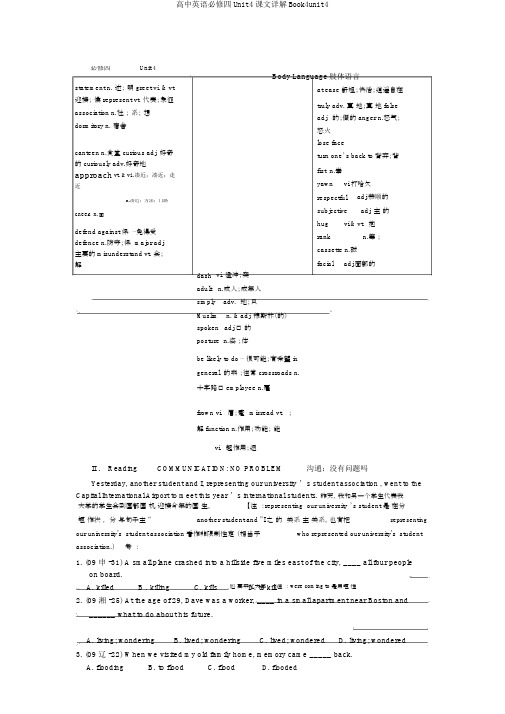
Body Language 肢体语言dash vi. 猛冲;突 adult n.成人;成年人 simply adv. 地;只Muslim n. & adj. 穆斯林(的)spoken adj.口 的 posture n.姿 ;体be likely to do ⋯ 很可能;有希望 in general 的来 ;往常 crossroads n.十字路口 employee n.雇frown vi. 眉;蹙 misread vt. ; 解 function n.作用;功能; 能vi. 起作用;运at ease 舒坦;快活;逍遥自在truly adv. 真 地;真 地 false adj. 的;假的 anger n.怒气;怒火lose faceturn one ’s back to 背弃;背fist n.拳 yawnvi.打哈欠respectful adj.恭顺的 subjective adj. 主 的hug vi & vt. 抱rankn.等 ;cassette n.磁 facial adj.面部的II . Reading COMMUNICATION: NO PROBLEM 沟通:没有问题吗Yesterday, another student and I, representing our university ’s student association , went to theCapital International Airport to meet this year ’s international students. 昨天,我和另一个学生代表我大学的学生会到国都国 机 迎接今年的国 生。
【注 :representing our university ’s student 是 在分短 作状 , 分 与句子主 “another student and ”I 之 的 关系 主 关系。
高中英语必修4unit4课文知识点讲解.ppt
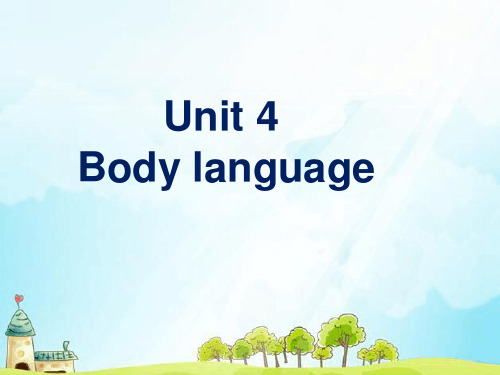
2.likely
However,people from places like Spain,Italy or South American countries approach others closely and are more _l_i_k_e_ly__ to touch them.(P26) 观察思考 Snows are likely to happen in the next 24 hours. One likely result of this heavy rain is the rising of the river. It’s highly likely that he will succeed.
(2)likely既可以用人也可以用物作主语,常用句型是: It is likely that...或sb./sth.is likely to...。
(3)possible和probable都不能以人作主语,常用句 型有: Possible常用It is possible (for sb.) to do sth.
二.重点单词
1.represent
Yesterday,another student and I,_r_e_p_r_e_s_e_n_t_i_n_g our university’s student association,went to the Capital International Airport to meet this year’s international students. (P26) 观察思考 The carvings represent a hunting scene.
He represented our school to take part in the competition and all of us were proud of him. 归纳总结 represent ___v_t._代_表__;__描__绘_;__表__现__。 (1)represent...as...把……描绘成……
高中英语必修4unit4课文知识点讲解(课堂PPT)
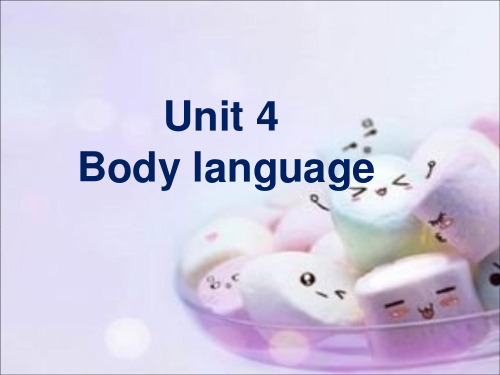
归纳总结 agreement __n_.协__议__;_一__致__;__同_意___。 1.Sign an agreement签定协议 1.break an agreement违反协议 3.reach/make an agreement达成协议 4.under an agreement根据协议 5.in agreement (with)(意见等)一致
即学即用 (1)对你周围的世界感到新奇是件好事。
It is good to _b_e__c_u_r_i_o_u_s__a_b_o_u_t_ the world around you. (2)我很想知道孩子们在做什么。
I’m _c_u_r_i_o_u_s__t_o__k_n_o_w_ what the children are
negotiations.
重点短语与句型
6.at ease
The most universal facial expression is,of course, the smile—its function is to show happiness and
at ease put people _______.(P30) 观察思考 1.He is at ease about the matter. 2.When you feel nervous,you’d better listen
—What does the E stand for?
——E代表什么? 即学即用 (1)她把自己描绘成世界上最好的母亲。
She Represents herself as the kindest
mother in the world.
(2)那个国家的外交部长代表该国出席了会议。
The country __w_a_s__r_e_p_r_e_s_e_n_t_e_d__a_t__t_h_e__c_o_n_f_e_r_e_n_ce
新课标人教版必修四Book4-Unit4-Reading
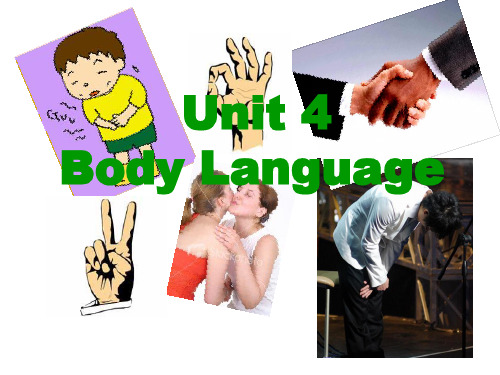
5.What do French people often do when they meet people they know? French people will shake hands and kiss each other twice on each cheek. 6.Can we expect people everywhere to act the same? Why? No, we can’t because not all cultures greet each other the same way .
Unit 4 Body Language
Check your answers
1. He will represent his company to attend this
meeting.
2. We should associate what we’ve learnt with our
daily life.
Why do we need to study body language?
Key words: help understand communicate learn about cultures avoid cause misunderstanding difficulties make a fool of ourselves(闹笑话) Useful expressions: Studying body language can…… If we don’t study……, we may……
Shake hands and stand quite close to other men. Nod to women but do not shake hands with them.
高一英语必修四Unit4using课文翻译全解及词汇
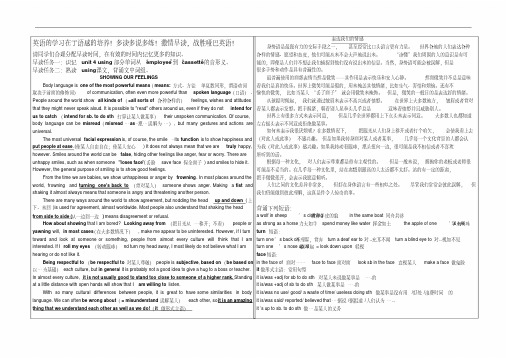
英语的学习在于语感的培养!多读多说多练!激情早读,战胜哑巴英语!请同学们合理分配早读时间,在有效的时间内记忆更多的知识。
早读任务一:识记unit 4 using 部分单词从“employee”到“cassette”的音形义。
早读任务二:熟读using课文,背诵文中词组。
SHOWING OUR FEELINGSBody language is one of the most powerful means(means: 方式、方法单复数同形,谓语动词取决于前面的修饰词)of communication, often even more powerful than spoken language(口语). People around the world show all kinds of(=all sorts of 各种各样的)feelings, wishes and attitudes that they might never speak aloud. It is possible to "read" others around us, even if they do not intend for us to catch (intend for sb. to do sth 打算让某人做某事)their unspoken communication. Of course, body language can be misread(misread…as…把…误解为…), but many gestures and actions are universal.The most universal facial expression is, of course, the smile – its function is to show happiness and put people at ease.(使某人自由自在;使某人安心) It does not always mean that we are truly happy, however. Smiles around the world can be false, hiding other feelings like anger, fear or worry. There are unhappy smiles, such as when someone "loses face"(丢脸save face 保全面子) and smiles to hide it. However, the general purpose of smiling is to show good feelings.From the time we are babies, we show unhappiness or anger by frowning. In most places around the world, frowning and turning one's back to(背对某人)someone shows anger. Making a fist and shaking it almost always means that someone is angry and threatening another person.There are many ways around the world to show agreement, but nodding the head up and down (上下、来回)is used for agreement, almost worldwide. Most people also understand that shaking the head from side to side (从一边到一边)means disagreement or refusal.How about showing that I am bored? Looking away from(把目光从…移开;不看)people or yawning will, in most cases(在大多数情况下), make me appear to be uninterested. However, if I turn toward and look at someone or something, people from almost every culture will think that I am interested. If I roll my eyes(转动眼球)nd turn my head away, I most likely do not believe what I am hearing or do not like it.Being respectful to(be respectful to 对某人尊敬)people is subjective, based on (be based on 以…为基础)each culture, but in genera l it is probably not a good idea to give a hug to a boss or teacher. In almost every culture, it is not usually good to stand too close to someone of a higher rank. Standing at a little distance with open hands will show that I am willing to listen.With so many cultural differences between people, it is great to have some similarities in body language. We can often be wrong about(= misunderstand误解某人)each other, so it is an amazing thing that we understand each other as well as we do!(it 做形式主语)表达我们的情感身势语是最强有力的交际手段之一,甚至经常比口头语言更有力量。
最新高一英语必修四Unit 4 Reading讲解word版本
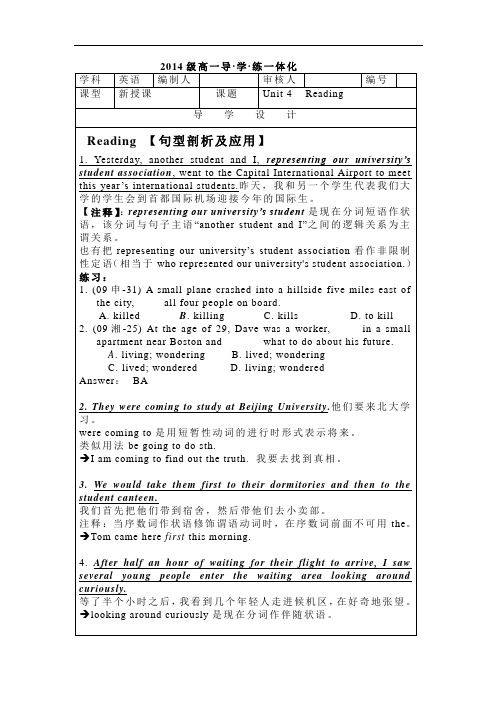
春节后复工安全注意事项
1.施工队伍进场后,参加安全教育培训及考试,未进行此项工作或考试不合格的,清退出场。
2.安全员须持证上岗(必须为有效证件),否则,不得担任安全员一职。
坚持每天做好安全记录,保证安全资料的连续、完整,以备检查。
3.施工班组在接受生产任务时,安全员必须组织班组全体作业人员学习、讲解安全技术措施,进行安全交底,未进行此项工作的,班组有权拒绝接受施工任务,并提出意见。
4.与本专业相关的工种,如:电工、电气焊工,必须经过专门培训,才能上岗作业。
5.所有施工人员应身体健康,无妨碍本工种的疾病。
年龄(以身份证为准)小于18岁,大于55岁(含55岁)的,不得从事施工作业。
6.所有施工人员须服从领导和安全检查人员的指挥。
工作时思想集中,坚守作业岗位,未经许可,不得从事非本工种作业。
7.所有施工人员必须熟知本工种的安全操作规程和施工现场安全生产制度。
不违章作业,并有责任制止他人违章作业;对管理人员的违章指挥,有权拒绝。
(完整版)高中英语必修4课文逐句翻译(人教版)

1.必修四Unit1A STUDENT OF AFRICAN WILDLIFE非洲野生动物研究者It is 5:45 am and the sun is just rising over Gombe National Park in East Africa. 清晨5点45分,太阳刚从东非的贡贝国家公园的上空升起,Following Jane's way of studying chimps, our group are all going to visit them in the forest. 我们一行人准备按照简研究黑猩猩的方法去森林里拜访它们。
Jane has studied these families of chimps for many years and helped people understand how much they behave like humans. 简研究这些黑猩猩家族已经很多年了,她帮助人们了解黑猩猩跟人类的行为是多么的相似。
Watching a family of chimps wake up is our first activity of the day. 我们当天的首项任务就是观察黑猩猩一家是如何醒来的。
This means going back to the place where we left the family sleeping in a tree the night before. 这意味着我们要返回前一天晚上我们离开黑猩猩一家睡觉的大树旁。
Everybody sits and waits in the shade of the trees while the family begins to wake up and move off. 大家坐在树荫下等待着,这时候猩猩们睡醒了,准备离开。
Then we follow as they wander into the forest. 然后这群黑猩猩向森林深处漫步而去,我们尾随其后。
人教版高中英语必修四Unit4课文翻译
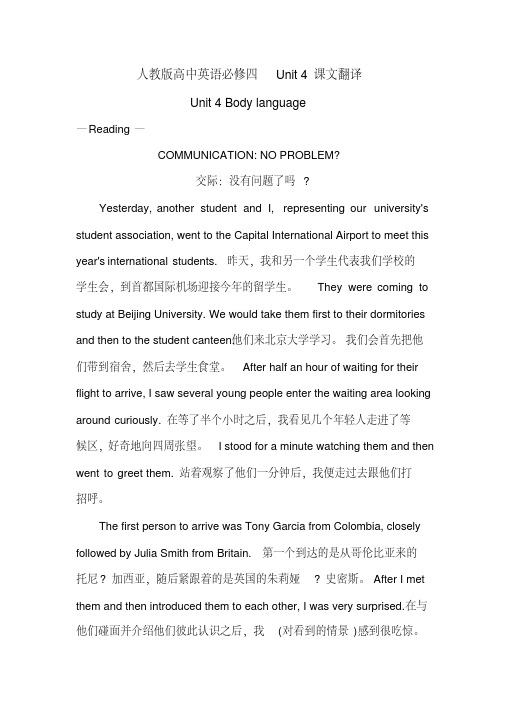
人教版高中英语必修四Unit 4课文翻译Unit 4 Body language―Reading―COMMUNICATION: NO PROBLEM?交际:没有问题了吗?Yesterday, another student and I, representing our university's student association, went to the Capital International Airport to meet this year's international students. 昨天,我和另一个学生代表我们学校的学生会,到首都国际机场迎接今年的留学生。
They were coming to study at Beijing University. We would take them first to their dormitories and then to the student canteen. 他们来北京大学学习。
我们会首先把他们带到宿舍,然后去学生食堂。
After half an hour of waiting for their flight to arrive, I saw several young people enter the waiting area looking around curiously. 在等了半个小时之后,我看见几个年轻人走进了等候区,好奇地向四周张望。
I stood for a minute watching them and then went to greet them. 站着观察了他们一分钟后,我便走过去跟他们打招呼。
The first person to arrive was Tony Garcia from Colombia, closely followed by Julia Smith from Britain. 第一个到达的是从哥伦比亚来的托尼?加西亚,随后紧跟着的是英国的朱莉娅?史密斯。
- 1、下载文档前请自行甄别文档内容的完整性,平台不提供额外的编辑、内容补充、找答案等附加服务。
- 2、"仅部分预览"的文档,不可在线预览部分如存在完整性等问题,可反馈申请退款(可完整预览的文档不适用该条件!)。
- 3、如文档侵犯您的权益,请联系客服反馈,我们会尽快为您处理(人工客服工作时间:9:00-18:30)。
必修四Unit 4课文详解杨磊译注1必修四Unit 4Body Language 肢体语言statement n.陈述;说明dash vi. 猛冲;突进at ease 舒适;快活;自由自在greet vi. & vt.迎接;问候adult n.成人;成年人truly adv. 真实地;真诚地represent vt. 代表;象征simply adv.简单地;只false adj.错误的;假的association n.社团;联系;联想Muslim n. & adj. 穆斯林(的)anger n.怒气;怒火dormitory n. 宿舍spoken adj.口语的lose face丢脸canteen n.食堂posture n.姿势;体态turn one’s back to 背弃;背对curious adj. 好奇的be likely to do ⋯很可能;有希望fist n.拳头curiously adv.好奇地in general总的来说;通常yawn vi. 打哈欠approach vt. & vi .接近;靠近;走近crossroads n.十字路口respectful adj.恭敬的n.接近;方法;途径employee n.雇员subjective adj. 主观的cheek n.面颊frown vi.皱眉;蹙额hug vi & vt. 拥抱defend against 保卫⋯以免受misread vt.读错;误解rank n.等级;军衔defence n.防御;保卫function n.作用;功能;职能cassette n.磁带major adj.主要的vi.起作用;运转facial adj.面部的misunderstand vt.误会;误解II . ReadingCOMMUNICATION: NO PROBLEM?交流:没有问题吗?Yesterday, another student and I,representing our university’s student association, went tothe Capital International Airport to meet this year 我们大学的学生会到首都国际机场迎接今年的国际生。
’s international students. 昨天,我和另一个学生代表【注释: representing our university’s student是现在分词短语作状语,该分词与句子主语“another student and I”之间的逻辑关系为主谓关系。
也有把representingour uninersity's student association 看作非限制性定语(相当于 who represented our university's student association.)考题:1.(09 申 -31) A small plane crashed into a hillside five miles east of the city, ____ all fourpeople on board.2.(09 湘 -25) At the age of 29, Dave was a worker, ____ in a small apartment near Boston and______ what to do about his future.A. living; wonderingB. lived; wonderingC. lived; wonderedD. living; wondered3. (09 辽 -22) When we visited my old family home, memory came _____ back. A. flooding B. to flood C. floodD. flooded4.(08 全 II-9) —— What are you reading, Tom?—— I ’m not really reading, just _____ the pages.A. turning offB. turning aroundC. turning overD. turning up5.(08京 -24)______ that she was going off to sleep, I asked if she’d like that little doll on her bed.A. SeeingB. To seeC. SeeD. Seen6.(08重 -29) _____ to reach them on the phone, we sent an email instead.A. FailB. FailedC. To failD. Having failed BAACAD 】They were coming to study at Beijing University.他们要来北大学习。
【注释:were coming to 是用短暂性动词的进行时形式表示将来。
类似用法be going to do sth. 】We would take them first to their dormitories and then to the student canteen. 我们首先把他们带到宿舍,然后带他们去小卖部。
【注释:当序数词作状语修饰谓语动词时,在序数词前面不可用 the。
如: Tom came here first this morning. 】After必修四Unit 4课文详解杨磊译注2 half an hour of waiting for their flight to arrive, I saw several young people enter the waiting arealooking around curiously 等了半个小时之后,我看到几个年轻人走进候机区,在好奇地张望。
【注释:.looking around curiously是现在分词作伴随状语。
】I stood for a minute watching them and thenwent to greet them. 我站一会儿,观察他们,然后过去跟他们打招呼。
The first person to arrive was Tony Garcia from Colombia, closely followed by Julia Smith from Britain. 第一个到达的是来自哥伦比亚的托尼·加西亚,紧跟着后面的是来自英国的茱莉亚·斯密斯。
【注释:the first person to arrive,非谓语动词修饰序数词或修饰有序数词修饰的名词时,常能用不定式形式。
试题:1) She was the first woman ____ the gold medal in the Olympics in the world.A. wonB. winsC. to winD. winning2) The last one _____ pays the meal.—— Agreed!A. arrivedB. arrivesC. to arriveD. arriving CC 】After I met them and then introduced them to each other, I was very surprised.当我接到他们并相互介绍完毕之后,我感到非常吃惊。
Tony approached Julia, touched her shoulder and kissed her on thecheek!托尼走到茱莉亚跟前,摸摸她的肩膀并吻了她的脸颊。
【注释:approach vt.向⋯靠近;接近;与⋯打交道;探讨; vi.靠近;临近;接近; n.靠近;临近;接近;通路;亲近的表示;方式(后跟 to );the approach of ⋯⋯的来临/临近; make approaches to sb.想接近某人;想与某人打交道;approach sb.about/ for sth.向某人要求某物;approach to sth.做某事的方式/方法;eg. 1) Snow announced the approachof winter. 雪宣告冬季的来临。
2) I like her approach to the problem. 我喜欢她解决这个问题的方法。
3)They made approaches to the team to buy one of their players. 他们与那支球队洽谈要买他们的一个球员。
试题:★ With winter _____, many animals are busy storing food.A. leavingB. disappearingC. appearing D . approaching】She stepped back appearing surprised and put up her hands, as if in defence.她向后退了一下,(脸上)显露出很吃惊,举起双手,似乎是在防卫。
【注释: as if conj.(连接词)(1) In the same way that itwould be if: 似乎,仿佛: eg.looked as if she were made of ice. 她看起来似乎是冰做的 .(2) That:相当于that: eg. It seemed as if the meeting would never end.看起来会议没完没了】I guessed that there wasprobably a major misunderstanding. 我想这主要可能是一个误会。
【注释:major adj .较大的;主要的 n.专业; vi.主修;专政;major in 攻读;专修;主修eg. Alice majors in economics. 爱丽丝主修经济学。
a/the majority of 大多数的;大半的eg.The majority of lone parents are divorced or separated women. 单身父母中大多数是离婚或分居的妇女。
Young people were in the majority at the meeting.这次会议年轻人占了很多。
